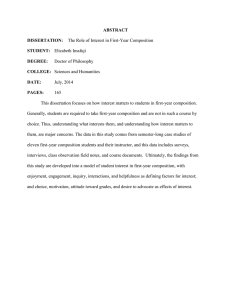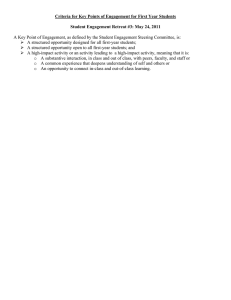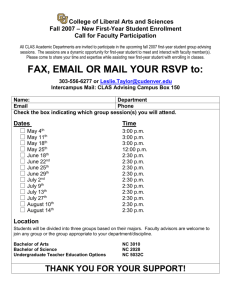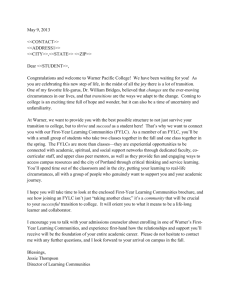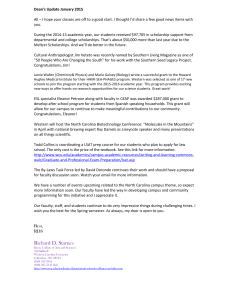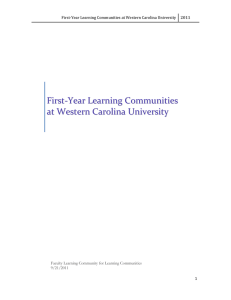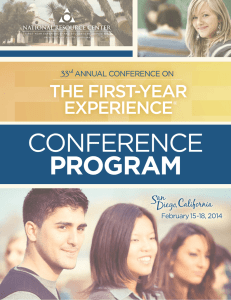What Every Student Should Know Service Learning and the First-Year Experience
advertisement
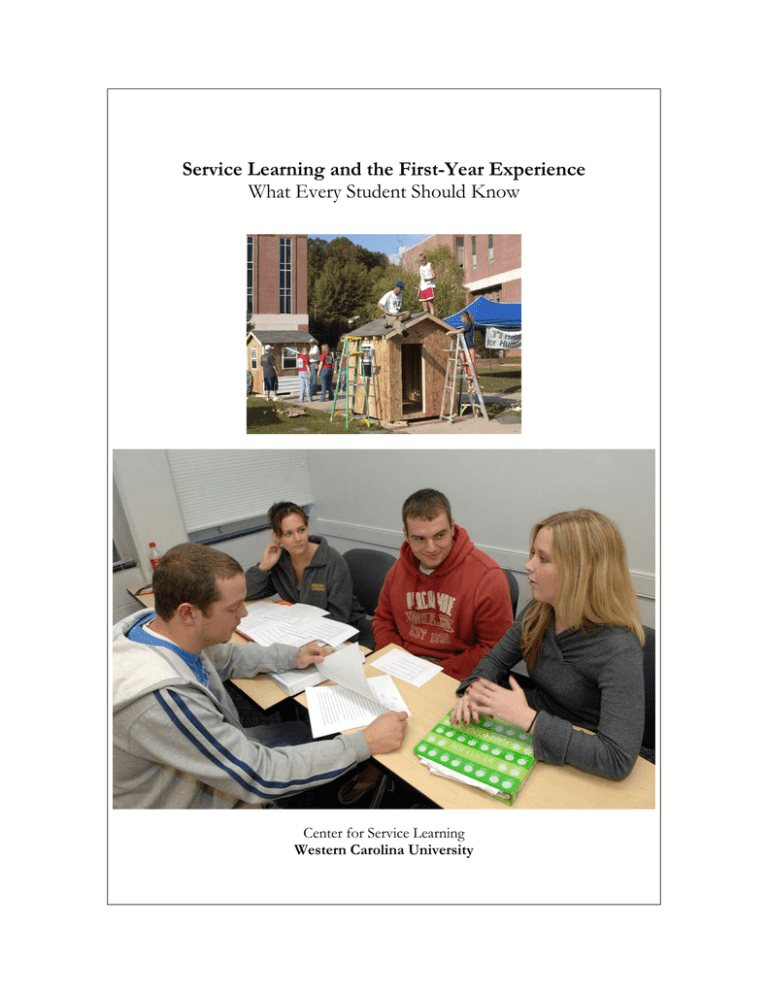
Service Learning and the First-Year Experience What Every Student Should Know Center for Service Learning Western Carolina University In support of the implementation of the Quality Enhancement Plan (QEP) Service Learning and the First-Year Experience What Every Student Should Know Glenn Bowen Center for Service Learning Western Carolina University servicelearning@wcu.edu August 2008 Service Learning and the First-Year Experience What Every Student Should Know E very student at Western Carolina University now has an opportunity to participate in service learning. For first-year students, the opportunities are special. As a WCU student, you are expected to integrate knowledge and skills from academic and co-curricular experiences to become intentional participants in your own learning. The process – included in the Quality Enhancement Plan (QEP) – begins the day you start your higher education journey at Western. As part of this process, you are expected to participate in civic engagement activities in the Western North Carolina community. Service learning is an effective avenue to civic engagement. At Western, service learning is defined as “a teaching and learning strategy that integrates community service with academic instruction and critical reflection in such a way that students gain further understanding of course content, meet community needs, develop career-related skills, and become responsible citizens.” Emphasis is placed on learning rather than on the service itself. Over the years, students have reported that their participation in service learning increased their motivation to learn; gave them a deeper understanding of course content; improved their critical-thinking, problem-solving, and communication skills; fostered selfconfidence and self-efficacy; enhanced their ability to work with others; stimulated a deeper understanding of complex social issues; helped them apply academic learning to real-life problems; and provided them with valuable work experience. SERVICE-LEARNING PROJECT You will be required to complete about five hours of service for each credit hour at an approved community agency or service site. (First-year course instructors will try to schedule the service project for the entire class or have students break into groups for this purpose.) Through the integration of community service into your course work, you will become more actively engaged in the learning process. In addition, you will take steps toward becoming active, responsible citizens as you make meaningful connections with the local community. The Center for Service Learning <servicelearning.wcu.edu> has an extensive list of agencies and sites where you may get involved in projects such as helping children learn to read; serving as a mentor to youth at risk; repairing or programming computers; organizing exhibits; preparing and serving meals at a soup kitchen; playing games with elderly people; building and repairing houses; collecting litter/assisting with beautification; taking care of animals; providing food and clothes to needy people; raising funds for charity; assisting with health screening; operating an emergency telephone hotline; assisting in organizing or running an event; creating a Web site or database; designing a brochure, newsletter, or other publication; writing public service announcements or press releases; writing letters to the editor of local newspapers; preparing a business or marketing plan; and 1 conducting a voter registration drive. Many community service opportunities are available for first-year students. If you do not have transportation (especially as a first-year student), you may limit your participation to two special events: Mountain Heritage Day on campus (last Saturday of September) and Make a Difference Day (fourth Saturday of October). The Kneedler Child Development Center and the Ramsey Regional Activity Center are service sites on campus, and Auxiliary Services at NCCAT is located across the highway. The Campus Kitchen Garden Project and CuRvE (Cullowhee Revitalization Endeavor) are initiatives in which you can participate as well. REFLECTION R eflection activities will help you connect the course content to your community service experience and help you gain a deeper understanding of the experience. Through the process of reflection, you and your instructor will assess your learning and development in relation to specific outcomes. Student Learning & Development Outcomes INTELLECTUAL GROWTH: You will employ critical-thinking skills to address a social issue in the community; use complex information from a variety of sources (including personal experience and observation) to form an opinion or make a decision EFFECTIVE COMMUNICATION: You will write and speak coherently and effectively; listen effectively and be able to engage in controversy with civility; make a presentation or give a performance CAREER EXPLORATION: You will articulate your career choice based on an assessment of your interests, values, skills, and abilities; document knowledge, skills, and accomplishments resulting from community-based learning; articulate the characteristics of a preferred work environment COLLABORATION: You will work cooperatively with others; seek the involvement of others; elicit feedback from others; contribute to the achievement of a group’s goals SOCIAL AND CIVIC RESPONSIBILITY: You will demonstrate civic engagement in campus, local, national, and global communities; identify your roles and responsibilities as engaged citizens by considering the public policies that affect choices and actions; appropriately challenge unfair, unjust, or uncivil behavior in the community APPRECIATION OF DIVERSITY: You will seek involvement with people different from yourself; challenge appropriately the abusive use of stereotypes by others; develop an informed perspective on issues of diversity and democracy; reflect on issues of power and privilege 2
